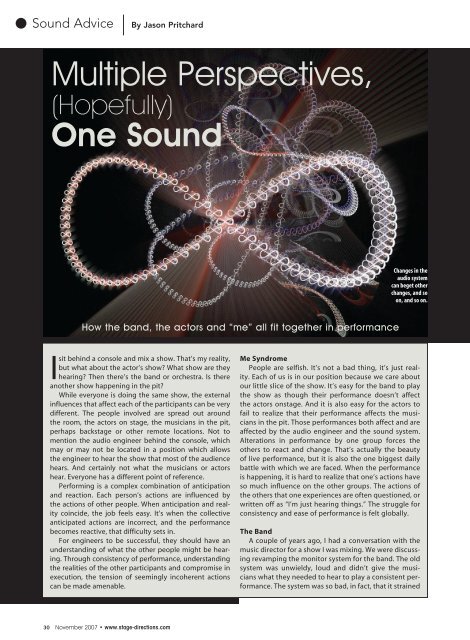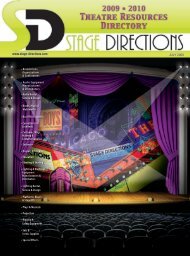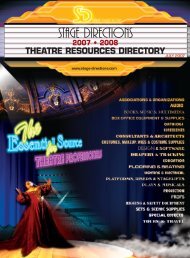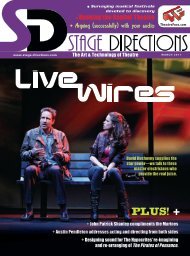Download a PDF - Stage Directions Magazine
Download a PDF - Stage Directions Magazine
Download a PDF - Stage Directions Magazine
You also want an ePaper? Increase the reach of your titles
YUMPU automatically turns print PDFs into web optimized ePapers that Google loves.
Sound Advice<br />
By Jason Pritchard<br />
Multiple Perspectives,<br />
(Hopefully)<br />
One Sound<br />
Changes in the<br />
audio system<br />
can beget other<br />
changes, and so<br />
on, and so on.<br />
How the band, the actors and “me” all fit together in performance<br />
I<br />
sit behind a console and mix a show. That’s my reality,<br />
but what about the actor’s show? What show are they<br />
hearing? Then there’s the band or orchestra. Is there<br />
another show happening in the pit?<br />
While everyone is doing the same show, the external<br />
influences that affect each of the participants can be very<br />
different. The people involved are spread out around<br />
the room, the actors on stage, the musicians in the pit,<br />
perhaps backstage or other remote locations. Not to<br />
mention the audio engineer behind the console, which<br />
may or may not be located in a position which allows<br />
the engineer to hear the show that most of the audience<br />
hears. And certainly not what the musicians or actors<br />
hear. Everyone has a different point of reference.<br />
Performing is a complex combination of anticipation<br />
and reaction. Each person’s actions are influenced by<br />
the actions of other people. When anticipation and reality<br />
coincide, the job feels easy. It’s when the collective<br />
anticipated actions are incorrect, and the performance<br />
becomes reactive, that difficulty sets in.<br />
For engineers to be successful, they should have an<br />
understanding of what the other people might be hearing.<br />
Through consistency of performance, understanding<br />
the realities of the other participants and compromise in<br />
execution, the tension of seemingly incoherent actions<br />
can be made amenable.<br />
Me Syndrome<br />
People are selfish. It’s not a bad thing, it’s just reality.<br />
Each of us is in our position because we care about<br />
our little slice of the show. It’s easy for the band to play<br />
the show as though their performance doesn’t affect<br />
the actors onstage. And it is also easy for the actors to<br />
fail to realize that their performance affects the musicians<br />
in the pit. Those performances both affect and are<br />
affected by the audio engineer and the sound system.<br />
Alterations in performance by one group forces the<br />
others to react and change. That’s actually the beauty<br />
of live performance, but it is also the one biggest daily<br />
battle with which we are faced. When the performance<br />
is happening, it is hard to realize that one’s actions have<br />
so much influence on the other groups. The actions of<br />
the others that one experiences are often questioned, or<br />
written off as “I’m just hearing things.” The struggle for<br />
consistency and ease of performance is felt globally.<br />
The Band<br />
A couple of years ago, I had a conversation with the<br />
music director for a show I was mixing. We were discussing<br />
revamping the monitor system for the band. The old<br />
system was unwieldy, loud and didn’t give the musicians<br />
what they needed to hear to play a consistent performance.<br />
The system was so bad, in fact, that it strained<br />
30 November 2007 • www.stage-directions.com

















